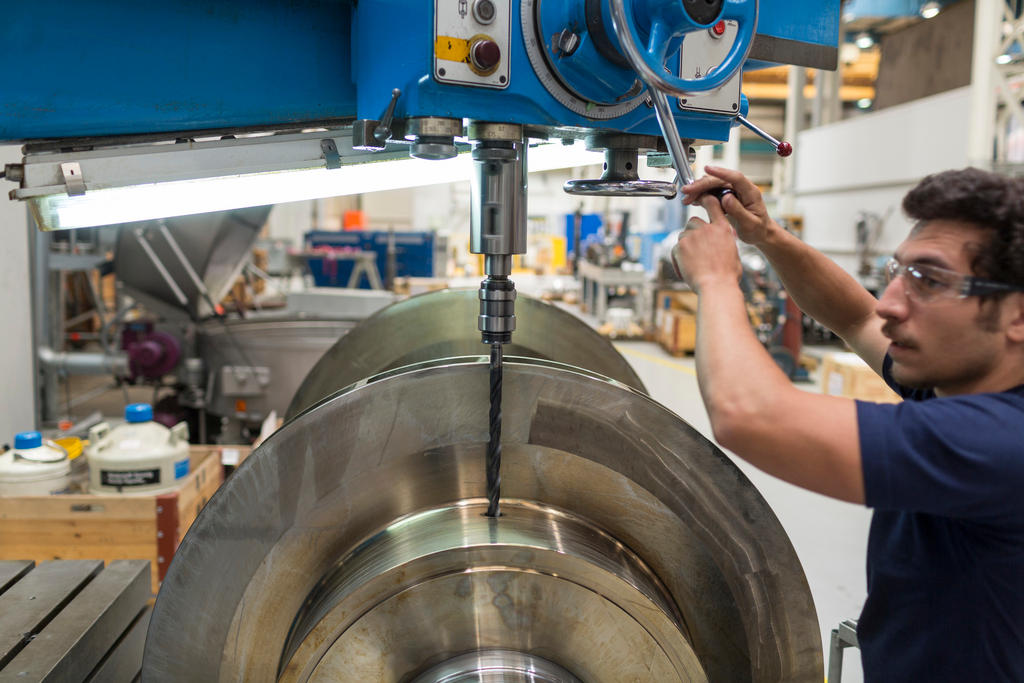Small firms accused of shunning innovation

Switzerland is the land of innovation, ranked either at the top or in the upper branches of global scorecards. But research suggests that small firms are leaving the innovation to big companies, mainly in pharma and IT. So what gives?
By some indicators, the DoppelleuExternal link brewery is an innovation flop. The Winterthur-based small and medium-sized enterprise (SME) does not file patents or have a huge research and development (R&D) budget. Yet it has increased capacity 20-fold within four years of opening to meet burgeoning demand for its popular craft beers.
Using a different gauge, Doppelleu has certainly found success through innovation. Craft beers are hardly new, but they found a successful niche market in Switzerland. Doppelleu’s broad offering – from pale ale to stout and whisky-infused beer – hit the mark with lager drinkers who hankered for something a bit different.

More
Brewer crafts a different kind of beer
But the true innovation was in marketing the product with the name “Chopfab”, a Swiss term meaning “heads off”.
“We wanted to be different from traditional Swiss breweries in every aspect,” Doppelleu co-founder Philip Bucher told swissinfo.ch. “We don’t have the Swiss Alps or cows on the bottles. We have a very urban, modern minimalist style. We wanted to address young men and women.”
Bucher explained that innovation for an SME is not about re-inventing the wheel. It’s a series of small yet significant steps in many stages of the business that turn ideas into concrete value.
“We don’t have patents that secure technology for our own use. We’re doing innovation in a different way. We’re innovative not by having distribution in-house but by having a variety of logistics partners, which speeds up the process,” he said.
“Our innovative marketing is well received by consumers. We have innovative sales stories. We’re the only brewery in Switzerland where all the sales people are beer sommeliers.”
Question of parameters
This might be where some researchers are missing the point. Last autumn, a study by canton Geneva’s chamber of commerce and the Cantonal Bank of Geneva focused on the amount of venture capital that start-ups attract (not enough according to the report) and the number of patents filed by companies.
A quarter of patents were filed by pharma heavyweights Novartis and Roche and another quarter by six other big firms. The study concluded that Switzerland’s top innovation survey rankings “mask certain weaknesses”.
In February, a KOF Swiss Economic Institute survey found that SMEs were committing increasingly less funds to R&D. While the total rate of R&D spending remains constant, “the percentage of companies engaging in R&D activities has declined, leading to growing concentration of R&D activities in Switzerland,” the survey found.
It appears that many SMEs are put off by the high cost of innovation, coupled with the length of time it takes to recoup the expenditure.
Changing mentality
This appears to confirm widespread fears that innovation spending is being eaten away by the margin-munching strong franc. Not necessarily so, according to Heinrich Christen, a partner at consultancy Ernst & Young, who specialises both in SMEs and the pharma industry.
“Some companies may have tightened R&D budgets because of the strong franc, but the smarter firms realised that they could only survive this stress through innovation. Typically, the more a company spends on innovation, the less it is troubled by unfavourable exchange rates,” he told swissinfo.ch.
“A big R&D budget does not necessarily mean more innovation. A lot of innovation is embedded in the ordinary way of doing business and cannot be easily measured. A typical Swiss SME is a supplier to larger companies and they innovate constantly to meet their clients’ specific needs.”
Christen is also unconvinced by the argument that big pharma is dominating innovation in Switzerland.
“They are actually doing less R&D in-house. The tendency is to outsource innovation to smaller firms either by taking them over or with licensing arrangements. Patents are a good indicator of innovation in the pharma sector, but less so in many other sectors. Some companies do not like to file patents because it means they are publicising their innovation to competitors.”
Doppelleu entrepreneur Philip Bucher is also dismissive of the allegation that SMEs are leaving innovation to the cash-rich multinationals.
“I’ve met hundreds of young entrepreneurs who are very innovative and are taking risks,” he said. “It appears to me that the Swiss have a very entrepreneurial spirit. Some decades ago, the Swiss economy was very much focused on large enterprises, but we’re in a process where this is changing.”

In compliance with the JTI standards
More: SWI swissinfo.ch certified by the Journalism Trust Initiative




You can find an overview of ongoing debates with our journalists here. Please join us!
If you want to start a conversation about a topic raised in this article or want to report factual errors, email us at english@swissinfo.ch.